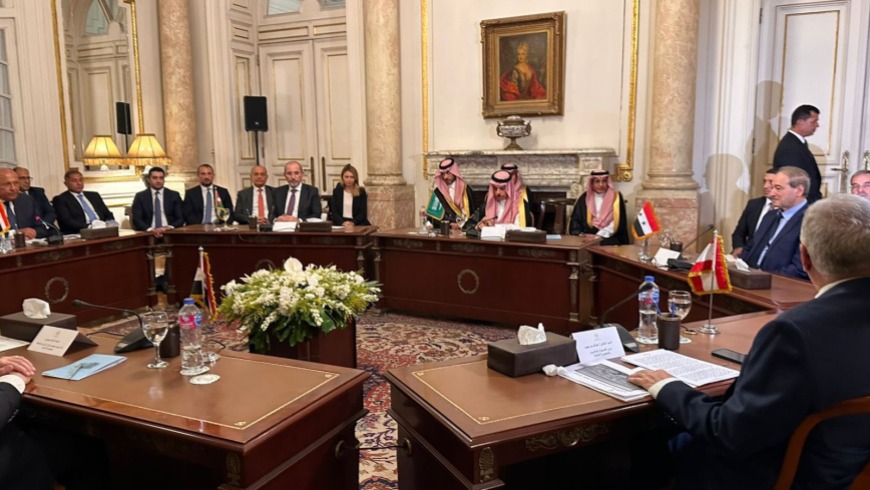The recent meeting of the Arab Ministerial Liaison Committee regarding the Syrian matter held in Cairo yielded unfavourable results for the Syrian regime, according to Arab diplomatic insiders who spoke to Syria TV. This outcome was influenced by the stance of countries backing the regime. Russia’s decision to suspend the Constitutional Committee’s activities in Geneva due to heightened tensions with Western nations, coupled with Iran’s confidence in Oman’s role and mediation efforts by the Sultanate, has complicated matters.
These informed Arab diplomatic sources, who are well-acquainted with the workings of the Special Arab Liaison Committee on Syria comprising the foreign ministers of Saudi Arabia, Egypt, Jordan, Iraq, and Lebanon, disclosed to Syria TV three key issues that have contributed to the slowdown in implementing the gradual plan established during the consultative meeting in Amman this past May.
Mekdad Urges Arab Unity, Affirms Commitment to Syria’s Sovereignty and Regional Stability
As per the sources, it has been revealed that Saudi Arabia had previously laid down a condition for the advancement of the step-by-step roadmap: the withdrawal of Iranian-backed militias, notably the Lebanese Hezbollah militia, from Syrian territories. This stipulation aimed to ensure the smooth progress of the roadmap’s implementation.
Saudi Arabia’s Concerns Regarding Iranian-Backed Militias
Furthermore, Saudi Arabia’s objective extends to curbing Hezbollah’s involvement in the Yemeni matter. This is due to the fact that Hezbollah’s operatives are exerting influence behind the scenes in the political negotiations between the Houthi group and Riyadh. Additionally, party members are overseeing the provision of military guidance to the Yemeni rebel faction.
Saudi Arabia’s overarching strategy involves interconnecting Yemen, Lebanon, and Syria issues. The rationale behind this approach is to reshape the current reality by creating linkages between these matters. The goal is to introduce complexity into the situation, thereby making it challenging to convince the global community to alter its approach to addressing the Syrian matter.
Amidst the events of the Riyadh summit and the Emirati meeting, I address the concept of Pan-Arabism, echoing the sentiments of Bashar al-Assad.
Broader Regional and International Context
A pressing concern has arisen due to mounting threats along the Jordanian border. Sources have pointed out that Jordan expresses dissatisfaction with the escalating dangers emerging from the Syrian territories adjacent to its border.
These threats have escalated to the extent that Iranian-backed militias, which have bolstered their presence near the Jordanian border, attempted to send an armed drone. However, the Jordanian army successfully intercepted and downed the drone on August 16th.
Syrian Regime Reluctant to Pursue Political Solutions
Adding to these issues, the Syrian regime’s reluctance to collaborate with Jordan in revealing the identities of Jordanian fighters involved in conflicts within Syria has raised security concerns for Jordan. Furthermore, attempts to smuggle illicit substances and weapons into Jordanian territory persist at a concerning rate.
A noticeable pause by Saudi Arabia and growing discontent within Jordan have resulted in a stagnation of Arab nations’ efforts to normalize relations with the Syrian regime.
The push for a political resolution remains a priority. However, the Syrian regime remains hesitant to fully commit to such efforts. Instead, it seems intent on prolonging discussions to advance its own vision for the solution. This vision centers on the implementation of Resolution 2254, involving the creation of a national unity government with participation from what they term as the “homegrown national opposition.”
The Syrian regime’s lack of response to Arab appeals for the reduction of authority held by security services and militias within the “Syrian state” presents a significant hurdle for Arab nations attempting to persuade Western powers to ease sanctions on the regime. The Syrian government’s insistence on tying any practical actions it takes to the initiation of repatriation funds flow, aimed at early recovery and economic stabilization, further complicates matters.
It’s evident that the deceleration of progress along the step-by-step path is intricately connected to both regional and international dynamics, extending beyond the conduct of the Syrian regime itself. This slowdown has coincided with recent signs indicating a partial resurgence of American interest in the Middle East. Washington has entered into various negotiations with regional stakeholders, aiming to dissuade them from pursuing courses of action aligned with Russia and Iran. Notably, the U.S. might be formulating a security strategy targeting Iranian-affiliated militias that traverse borders. Such a development could potentially provide Arab nations with alternative avenues for engaging with the Syrian regime. This scenario could compel these nations to be more flexible in their negotiations and discussions.
In essence, the progression of the step-by-step approach seems to be influenced by a complex interplay of regional and international factors, rather than being solely dependent on the behaviour of the Syrian regime itself. The recent geopolitical shifts and potential shifts, including renewed U.S. engagement and evolving security strategies, could reshape the landscape and dynamics surrounding the Syrian conflict.
This article was translated and edited by The Syrian Observer. The Syrian Observer has not verified the content of this story. Responsibility for the information and views set out in this article lies entirely with the author.


